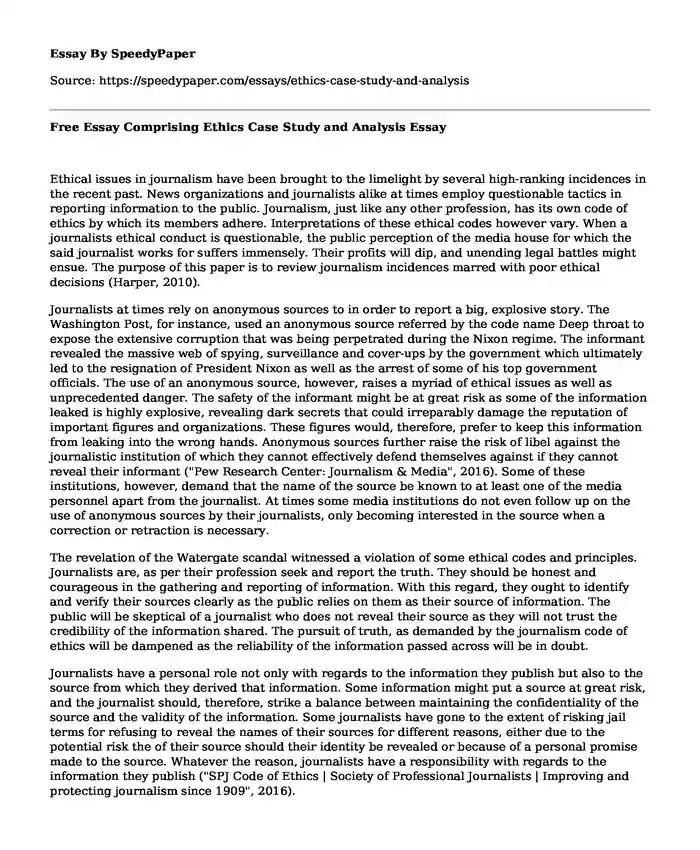
| Type of paper: | Essay |
| Categories: | Ethics Media Case study Social media |
| Pages: | 3 |
| Wordcount: | 654 words |
Ethical issues in journalism have been brought to the limelight by several high-ranking incidences in the recent past. News organizations and journalists alike at times employ questionable tactics in reporting information to the public. Journalism, just like any other profession, has its own code of ethics by which its members adhere. Interpretations of these ethical codes however vary. When a journalists ethical conduct is questionable, the public perception of the media house for which the said journalist works for suffers immensely. Their profits will dip, and unending legal battles might ensue. The purpose of this paper is to review journalism incidences marred with poor ethical decisions (Harper, 2010).
Journalists at times rely on anonymous sources to in order to report a big, explosive story. The Washington Post, for instance, used an anonymous source referred by the code name Deep throat to expose the extensive corruption that was being perpetrated during the Nixon regime. The informant revealed the massive web of spying, surveillance and cover-ups by the government which ultimately led to the resignation of President Nixon as well as the arrest of some of his top government officials. The use of an anonymous source, however, raises a myriad of ethical issues as well as unprecedented danger. The safety of the informant might be at great risk as some of the information leaked is highly explosive, revealing dark secrets that could irreparably damage the reputation of important figures and organizations. These figures would, therefore, prefer to keep this information from leaking into the wrong hands. Anonymous sources further raise the risk of libel against the journalistic institution of which they cannot effectively defend themselves against if they cannot reveal their informant ("Pew Research Center: Journalism & Media", 2016). Some of these institutions, however, demand that the name of the source be known to at least one of the media personnel apart from the journalist. At times some media institutions do not even follow up on the use of anonymous sources by their journalists, only becoming interested in the source when a correction or retraction is necessary.
The revelation of the Watergate scandal witnessed a violation of some ethical codes and principles. Journalists are, as per their profession seek and report the truth. They should be honest and courageous in the gathering and reporting of information. With this regard, they ought to identify and verify their sources clearly as the public relies on them as their source of information. The public will be skeptical of a journalist who does not reveal their source as they will not trust the credibility of the information shared. The pursuit of truth, as demanded by the journalism code of ethics will be dampened as the reliability of the information passed across will be in doubt.
Journalists have a personal role not only with regards to the information they publish but also to the source from which they derived that information. Some information might put a source at great risk, and the journalist should, therefore, strike a balance between maintaining the confidentiality of the source and the validity of the information. Some journalists have gone to the extent of risking jail terms for refusing to reveal the names of their sources for different reasons, either due to the potential risk the of their source should their identity be revealed or because of a personal promise made to the source. Whatever the reason, journalists have a responsibility with regards to the information they publish ("SPJ Code of Ethics | Society of Professional Journalists | Improving and protecting journalism since 1909", 2016).
References
Harper, R. (2010). The Social Media Revolution: Exploring the Impact on Journalism and News Media Organizations. Student Pulse, 2(03). Retrieved from http://www.inquiriesjournal.com/articles/202/the-social-media-revolution-exploring-the-impact-on-journalism-and-news-media-organizations
Pew Research Center: Journalism & Media. (2016). Journalism.org. Retrieved 6 June 2016, from http://www.journalism.org/
SPJ Code of Ethics | Society of Professional Journalists | Improving and protecting journalism since 1909. (2016). Spj.org. Retrieved 6 June 2016, from http://www.spj.org/ethicscode.asp
Cite this page
Free Essay Comprising Ethics Case Study and Analysis. (2019, Sep 30). Retrieved from https://speedypaper.net/essays/ethics-case-study-and-analysis
Request Removal
If you are the original author of this essay and no longer wish to have it published on the SpeedyPaper website, please click below to request its removal:
- Memorable Event Essay Example
- Free Essay Sample on Finance-related Stress Relief
- Should teachers be able to carry concealed weapons on campus?
- Comparative Essay Example on Macbeth and Lady Macbeth
- Law Essay Example: Bill C-31 and Bands
- Meanings Behind "Othello the Moor of Venice" by Shakespeare
- Free Essay Sample on Teaching Strategies for Students with Hearing Impairments
Popular categories




